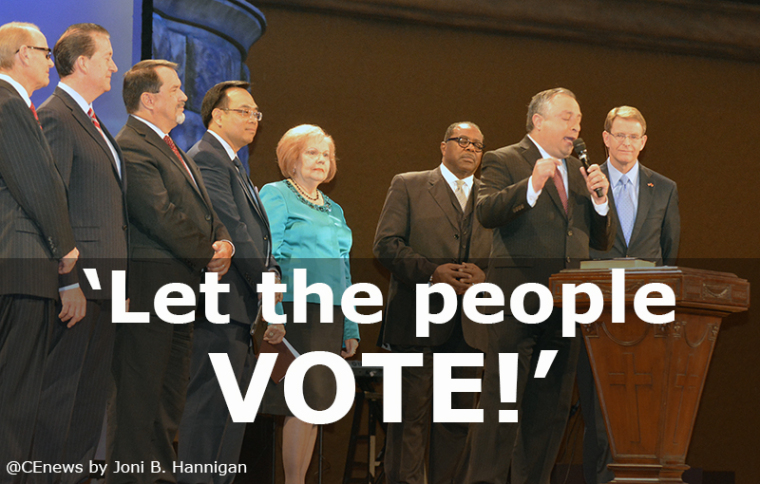#Houston5 prevail to get controversial gay rights referendum on the November ballot

HOUSTON (Christian Examiner) – A controversial ordinance conferring protected class status to individuals based on their sexual orientation and gender identity will go before Houston voters Nov. 3, more than a year after a coalition of pastors and civic leaders known as the Houston Five organized a referendum petition to repeal it.
"If the ballot language is wrong, everything gets undone," Taylor told city council Aug. 4 during its public comment session of the weekly meeting
But there may be more legal trouble for the measure before ballots are even printed.
The racially and politically diverse group of senior evangelical pastors of the Houston Area Pastors Council (HAPC) rallied around cries of "Let the people vote" in their lawsuit against Mayor Annise Parker and then-City Attorney David Feldman, and accused both of usurping the authority of the city charter in order to dismiss the almost 55,000-signature referendum petition.
The coalition lost their legal challenge in district court and was awaiting a hearing in a Texas appellate court when the Texas Supreme Court, acting on a writ of mandamus plea from the pastors, said the required number of signatures on the petition was duly certified by City Secretary Anna Russell. The petition was valid and the city must act according to its charter, the court said.
After the City Council voted 5-12 on Aug. 5 to not repeal the ERO, it was determined the measure would automatically be on the November ballot. But Andy Taylor, the pastor's attorney, the wording crafted by the city's legal department disregards the city charter and the Supreme Court's unanimous directive.
"If the ballot language is wrong, everything gets undone," Taylor told city council Aug. 4 during its public comment session of the weekly meeting.
"I don't know how we can make the language any plainer," Mayor Annise Parker said.
Parker read the text: "Shall the City of Houston repeal the Houston Equal Rights Ordinance, Ord. No. 2014-530, which prohibits discrimination in city employment and city services, city contracts, public accommodations, private employment, and housing based on an individual's sex, race, color, ethnicity, national origin, age, familial status, marital status, military status, religion, disability, sexual orientation, genetic information, gender identity, or pregnancy?"
But Councilman C.O. Bradford, an attorney and most vocal critic of ballot language agreed with Taylor's assessment.
"The way you have cited the ballot language is correct," he said to Taylor. "Council can vote to repeal its actions. There will not be an ordinance in effect on Nov. 3. Therefore there will be nothing for the voters to repeal on Nov. 3."
Bradford asked Taylor if the language, as submitted by Parker, was "improper and illegal."
Taylor, who specializes in election code, said, "Correct."
Bradford voted for the ordinance last year but opposed the ballot language because he wanted "the ballot to be right." He offered substitute language that was rejected by a 12-5 vote. Adamant, Bradford warned his colleagues if they did not change the ballot language the city would be back in court, especially if recent actions held a precedent.
In June the Texas Supreme Court ruled the City of Houston mislead voters on a 2010 ballot initiative enacting a drainage amendment. The proposition narrowly passed but the ballot language failed to note the new drainage plan excised a fee on Houston residents.
"Mayor we want the language right. We don't want to come back two years from now and have the Supreme Court say we were egregiously misleading the language," said Kubosh referring to the back-to-back Supreme Court rulings.
But Parker insisted the language on the ballot was consistent with the petition circulated last year to repeal the ERO. Dave Welch, HAPC executive director, said that connection may make sense but it was inconsistent with the Supreme Court directive and the city charter, both of which call for a popular vote on the ordinance.
Welch also noted that while the city charter "reigned supreme" for city's defense attorneys during the trial over the referendum signatures "when it's not so convenient for them, it's not so supreme."
"The [city] charter dictates what we need to do," said Councilman Dave Martin.
Reading from it he said, "[S]uch ordinance or resolution shall not take effect unless a majority of the qualified voters voting thereon at such election shall vote in favor thereof."
The popular vote, he said, is a vote "for" or "against" the enactment of a proposition. No law has been adopted by voting against its repeal – which is what the ballot language would do. Frustrated by Parker's refusal to see another potential legal conflict, Martin called the mayor's proposed language a "purposeful attempt to mislead voters."
Welch said the coalition would announce Friday whether they would press the issue or let the ballot wording stand. The Texas Supreme Court gave Houston City Council until Aug. 24 to comply with their directive to repeal or put the ordinance to a popular vote.
RELATED ARTICLES:
Pastor says 'never' to Houston mayor's demand for sermon & notes
FBC Houston's Gregg Matte: 'When one pastor is subpoenaed, all pastors are subpoenaed'